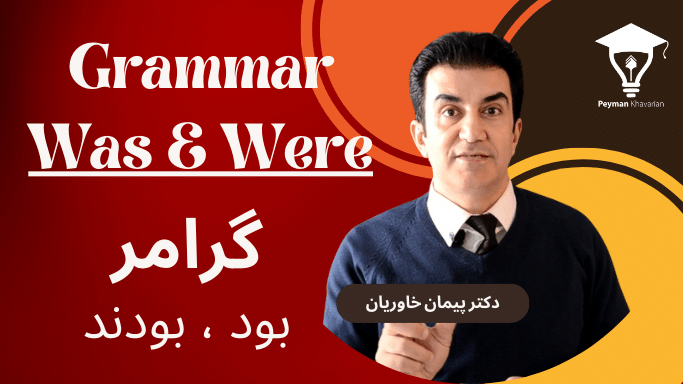پیچیدگی های ‘بود’ و ‘بودند’ در دستور زبان انگلیسی The Intricacies of ‘Was’ and ‘Were’ in English Grammar

The Intricacies of ‘Was’ and ‘Were’ in English Grammarدستور زبان
The English language, with its rich history and global usage, is filled with grammatical rules and exceptions. Among these, the use of the words “was” and “were” stands out as a fundamental aspect of English grammar. These two words, though seemingly simple, play a crucial role in maintaining the tense and subject-verb agreement in sentences.
Understanding ‘Was’ and ‘Were’
“Was” and “were” are both past tense forms of the verb “to be”. The verb “to be” is one of the most commonly used verbs in the English language and has different forms according to the tense. In the past tense, “was” is used with singular subjects, while “were” is used with plural subjects.
Usage of ‘Was‘
“Was” is used with the first and third person singular past tense. It is used with pronouns like “I”, “he”, “she”, and “it”, and with singular nouns. For example, in the sentence “I was at the park”, “was” is used because the subject “I” is singular. Similarly, in “The cat was playing with a ball”, “was” is used with the singular noun “cat”.
Usage of ‘Were‘
“Were”, on the other hand, is used with you, we, and they, and with plural nouns. For instance, in the sentence “They were at the concert”, “were” is used because “they” is a plural pronoun. Similarly, in “The dogs were barking at the mailman”, “were” is used with the plural noun “dogs”.
‘Was’ and ‘Were’ in Subjunctive Mood
An interesting exception to these rules is the use of “were” in the subjunctive mood, which is used to express hypothetical situations, wishes, or conditions contrary to fact. In the subjunctive mood, “were” is used with singular subjects as well. For example, “If I were a bird, I would fly high in the sky”. Here, even though “I” is singular, “were” is used instead of “was”.
Conclusion
In conclusion, “was” and “were” are integral parts of English grammar, ensuring the correct tense and subject-verb agreement. While they are generally straightforward in their usage, exceptions like the subjunctive mood make them fascinating subjects of study. Understanding these rules and exceptions is key to mastering English grammar and becoming a proficient user of the language.
زبان انگلیسی با تاریخچه ی غنی و استفاده ی جهانی خود، پر از قواعد دستور زبان و استثنائات است. در بین اینها، استفاده از کلمات “بود” و “بودند” به عنوان یک جنبه ی اساسی از دستور زبان انگلیسی برجسته است. این دو کلمه، با وجود سادگی ظاهری، نقش حیاتی در حفظ زمان و توافق فعل-موضوع در جملات ایفا می کنند.
درک ‘بود’ و ‘بودند‘
“بود” و “بودند” هر دو فرم گذشته ی فعل “بودن” هستند. فعل “بودن” یکی از افعال متداول در زبان انگلیسی است و بسته به زمان، فرم های مختلفی دارد. در زمان گذشته، “بود” با موضوعات تکیل استفاده می شود، در حالی که “بودند” با موضوعات جمع استفاده می شود.
استفاده از ‘بود
“بود” با زمان گذشته ی شخص اول و سوم تکیل استفاده می شود. این با ضمایری مانند “من”، “او” (مذکر و مونث) و “آن” و با اسم های تکیل استفاده می شود. به عنوان مثال، در جمله “من در پارک بودم”، “بود” استفاده می شود زیرا موضوع “من” تکیل است. به طور مشابه، در “گربه با توپ بازی می کرد”، “بود” با اسم تکیل “گربه” استفاده می شود.
استفاده از ‘بودند’
“بودند”، از طرف دیگر، با شما، ما، و آنها، و با اسم های جمع استفاده می شود. به عنوان مثال، در جمله “آنها در کنسرت بودند”، “بودند” استفاده می شود زیرا “آنها” ضمیر جمع است. به طور مشابه، در “سگ ها به پستچی پارس می کردند”، “بودند” با اسم جمع “سگ ها” استفاده می شود.
‘بود’ و ‘بودند’ در حالت فرضی
یک استثناء جالب برای این قواعد، استفاده از “بودند” در حالت فرضی است که برای بیان وضعیت های فرضی، آرزوها، یا شرایط مخالف با واقعیت استفاده می شود. در حالت فرضی، “بودند” نیز با موضوعات تکیل استفاده می شود. به عنوان مثال، “اگر من پرنده بودم، در آسمان پرواز می کردم”. در اینجا، حتی اگر “من” تکیل باشد، به جای “بود”، “بودند” استفاده می شود.
نتیجه گیری
در نتیجه، “بود” و “بودند” بخش جدایی ناپذیری از دستور زبان انگلیسی هستند، و با اطمینان از زمان صحیح و توافق فعل-موضوع اطمینان می دهند. در حالی که آنها بطور کلی در استفاده ی خود ساده هستند، استثنائاتی مانند حالت فرضی آنها را موضوعات جذاب مطالعه می کند. درک این قواعد و استثنائات کلیدی برای تسلط بر دستور زبان انگلیسی و تبدیل شدن به کاربر ماهر زبان است.
Examples of ‘Was’:
I was very tired yesterday.
She was the best student in the class last year.
It was a sunny day.
The movie was really interesting.
He was at home all day.
Examples of ‘Were’:
We were at the beach last weekend.
They were very excited about the trip.
You were late for the meeting.
The cookies were delicious.
The kids were playing in the park.
Remember, ‘was’ is used with singular subjects, and ‘were’ is used with plural subjects. However, in the subjunctive mood, ‘were’ can also be used with singular subjects to express hypothetical situations. For example, “If I were a millionaire, I would travel the world.”







دیدگاهتان را بنویسید